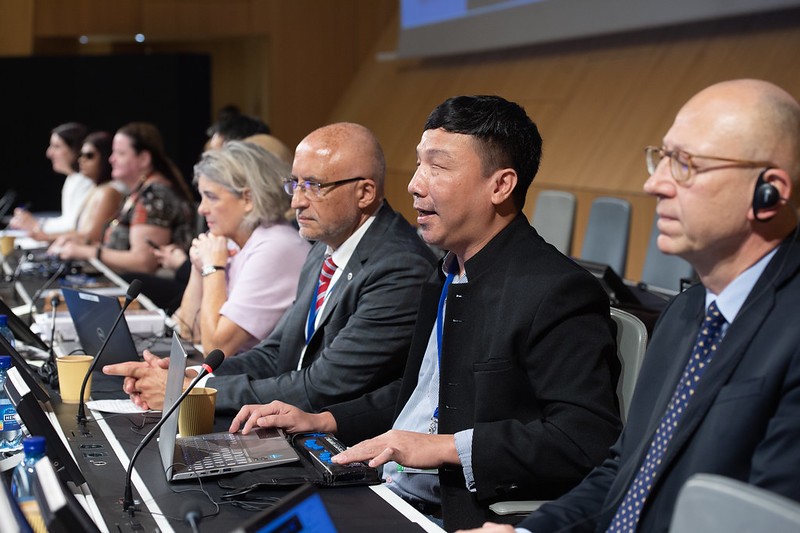he Accessible Books Consortium is a public-private partnership led by WIPO and includes organizations that represent people with print disabilities, libraries for the blind, standards bodies, and organizations representing authors, publishers and collective management organizations.
Its goal is to increase the number of books published worldwide in accessible formats. There are representatives of the different stakeholders on ABC’s board, and I have the honour of being one of the publisher representatives, together with my colleague and friend Laura Brady and IPA’s Secretary General, José Borghino.
Because of the pandemic, this was our first presential meeting after four years. Many of us had never met in person, so we were really expecting this occasion. Our meeting coincided with WIPO’s General Assembly, so it was a good opportunity to celebrate the first 10 years of the adoption of the Marrakesh Treaty.
This meaningful treaty, that establishes a copyright exception for people with print disabilities, was adopted on 27 June 2013, with the strong support of the IPA. It happened during a diplomatic conference convened by the Word Intellectual Property Organization, WIPO, in the city of Marrakesh.
At that time, IPA president YS Chi led the IPA delegation in Marrakesh and was eager to speak for the first time at a WIPO meeting on behalf of world publishers. The delegate from a developing country questioned the position of publishers on the possible treaty. There were diverging opinions and many people thought that publishers were trying to block an agreement.
But YS and the IPA didn’t want to preclude a treaty; rather, they wanted to find a way to do it right. The question gave YS the opportunity to state the IPA’s position clearly and he said that ‘every single book we publish should be accessible for all’. The room went silent.
He went on to explain that technology now allowed publishers to do so. It was an amazing moment for YS. He felt proud of the work done. The IPA had been able to show its support for this important cause while, at the same time, ensuring a very clear wording that would prevent misuse of this copyright exception.
It had been important to ensure that this new treaty did not change the fundamental principles of international copyright law. The preservation of the so-called ‘three-step test’ as the limitation for any exceptions had been successful.
Now, ten years after its adoption, the Marrakesh Treaty has been ratified by 93 countries, including the European Union counting as one, representing 119 WIPO member states.
The anniversary celebration of this significant treaty was held during WIPO’s General Assembly, and included speeches by WIPO’s Director General, Daren Tang, as well as five of the stakeholders.
The ABC board members arrived early, keen to take part in this historic celebration. The speakers were ushered through a back door, directly to the stage of WIPO’s modern conference hall.
Presided by Ambassador Tatiana Molceanu, the Republic of Moldova’s Permanent Representative to the UN Office, the General Assembly started on time as planned.
The first speaker was WIPO’s Director General. Mr. Tang said that “The Marrakesh Treaty is not just about law but most importantly it is about opportunity. Opportunity for schoolchildren with visual impairments or disabilities to study at the same pace as their peers. Opportunity for people in this community to pursue careers otherwise closed off to them.”
The speeches of my fellow board members were moving. Ms. Praveena Sukhraj-Ely narrated her experience as a blind child growing up in South Africa with little access to textbooks. Mr. Dang Hoai Phúc, from Vietnam, told the story of how he lost his sight due to a land mine explosion when he was nine years old.
During my intervention, I said that “It is true that publishers don’t like exceptions and limitations to copyright in general, because they can have devastating effects. But in this case, it was absolutely necessary for there to be a Treaty, as a human right of the visually impaired to have access to knowledge and literature.”
“There is a Buddhist proverb that says that ‘if you are facing in the right direction, all you have to do is keep on walking.’ The Marrakesh Treaty is a fundamental landmark that has put us in the right direction. Let us continue to walk towards a more equitable and accessible world.”
If you haven’t started your own journey in accessible publishing yet, one of the best ways to do so is by signing the Charter of Accessible Publishing here. I invite you to do so today. We should not leave anyone behind.
With extracts of the book “The Fifth Quarter Century: The International Publishers Association 1996-2021”, available as a pdf on IPA’s 125th anniversary website as well as in e-book format on all major e-book vendor platforms, published by Conecta, an imprint of Penguin Random House.

